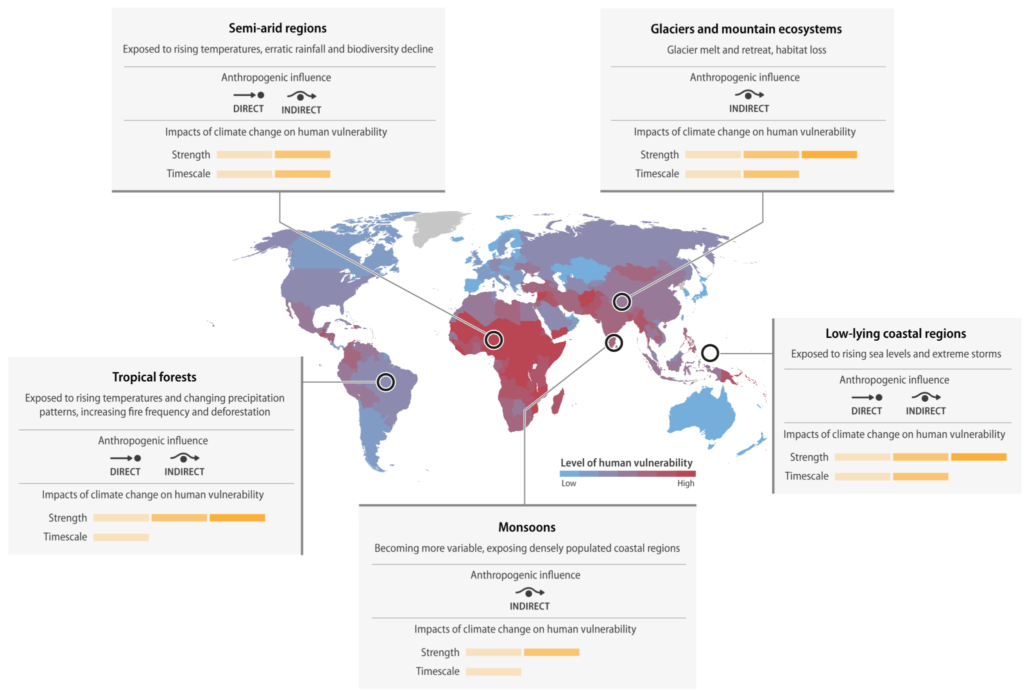The 10 New Insights in Climate Science presents key insights from the latest climate change-related research this year and responds to clear calls for policy guidance during this climate-critical decade. The authors emphasize and unpack the complex interactions between climate change and other drivers of risk, such as conflicts, pandemics, food crises and underlying development challenges in the report.
The scientific synthesis report identifies that the potential to adapt to climate change is not limitless. Rising sea levels capable of submerging coastal communities and extreme heat intolerable to the human body, are examples of ‘hard’ limits to our ability to adapt. It also highlights that over 3 billion people will inhabit ‘vulnerability hotspots’ — areas with the highest susceptibility to being adversely affected by climate-driven hazards — by 2050, double what it is today.
The report further outlines that persistent dependence on fossil fuels exacerbates major vulnerabilities, notably for energy and food security, and that deep and swift mitigation to tackle the drivers of climate change is immediately necessary to avert and minimise future loss and damage.
“People and ecosystems in different places across the world are already confronted with enormous impacts, and if the planet warms beyond 1.5/2°C, more widespread breaching of adaptation limits canbe expected.
Adaptation efforts cannot substitute for ambitious mitigation,” says said Prof. Mercedes Bustamente, Department of Ecology, University of Brasilia, Brazil \”The latest science confirms the rising social costs of severe climate extremes and the urgent need to deviate away from risks of going beyond limits to adaptation and crossing irreversible tipping points. As science advances, we have more evidence of massive costs, risks but also global benefits of reduced loss and damage, through an orderly safe landing of the world within the Paris climate range.
To succeed requires global collaboration and speed at an unprecedented scale,” says Prof. Johan Rockström, co-chair of the Earth League, the Earth Commission and Director of the Potsdam Institute for Climate Impact Research.
“Decision makers must recognise the interconnectedness of biophysical-social challenges, and that the most impactful responses are not siloed. Substantially shifting the allocation of capital and land use towards meaningful mitigation, enacting robust and coordinated global policy responses for adaptation, loss and damage, as well as deconstructing the barriers to just climate action are some of the approaches identified within the report to accelerate reaching Paris Agreement Goals,” says Prof. Chukwumerije Okereke, Alex Ekwueme Federal University Ndufu-Alike, Nigeria
In 2022, the 10 New Insights in Climate Science covers crucial topics that are key focus areas for negotiators at COP27, from adaptation and mitigation, to the intersections of climate and food systems, security, and finance: 1. Questioning the myth of endless adaptation
2. Vulnerability hotspots cluster in ‘regions at risk’
3. New threats on the horizon from climate-health interactions
4. Climate mobility: From evidence to anticipatory action
5. Human security requires climate security
6. Sustainable land use is essential to meeting climate targets
7. Private sustainable finance practices are failing to catalyse deep transitions
8. Loss and Damage: The urgent planetary imperative
9. Inclusive decision-making for climate-resilient development
10. Breaking down structural barriers and unsustainable lock-ins
“We need an urgent, global and coordinated response to reverse the growth of greenhouse gas emissions to secure a safe and just future for humankind. In a year of compounding crises, including geopolitical instability, extreme weather events, and reverberations from the pandemic, 10 New Insights in Climate Science delivers essential research findings to inform decisions,” says Wendy Broadgate, Global Hub Director (Sweden), Future Earth.

